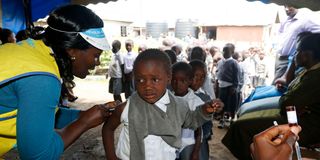Ministry to vaccinate 1.2 million children during measles, rubella campaign drive

Pupils from Melon Mission School in Nakuru County receive a Measles-Rubella vaccine during a past campaign.
The Ministry of Health aims to vaccinate 1.2 million children during the Measles and Rubella Campaign.
According to a statement by the ministry, Kenya is experiencing a measles outbreak in six counties, including Garissa, Mandera, Marsabit, Nairobi, Turkana, and Wajir.
The Ministry says the six counties have less than 90 per cent coverage of the routine first and second-dose measles vaccines, with reduced access due to highly mobile nomadic populations and the influx of refugees.
“The ongoing drought further compounds the problem with a large population of vulnerable malnourished children,” the ministry said in a statement to media houses.
To respond to the outbreak, the MoH, in partnership with Gavi, will conduct a vaccination campaign in seven counties starting December 9 to December 18.
The seven counties include Marsabit, Wajir, Garissa, Nairobi, Turkana, Turkana, Mandera, and West Pokot.
Also read: Why Nyamira topped in measles vaccine uptake
Those who will be vaccinated are children from nine months to about five years or 59 months.
“The vaccine will be delivered through fixed posts and temporary-fixed outreach posts,” MoH added.
Measles and rubella are highly infectious diseases caused by viruses, for which human beings are the only reservoir.
Rubella is a viral illness that causes a mild fever and a skin rash and is spread through contact with fluid from the nose and throat. It can be prevented with a rubella vaccine. The vaccine is first administered to a child between 12 months to 15 months and then again between ages four and six.
Since 2016, the meales and Rubella vaccine has been offered as part of Kenya's routine childhood immunisation program, with one dose administered at nine months and the second dose at 18 months.
To ensure adequate community protection, at least 95 percent of children must receive the two recommended doses.
In 2020, only 85 percent of children in Kenya received the first dose, and less than 50 percent had the second dose.





